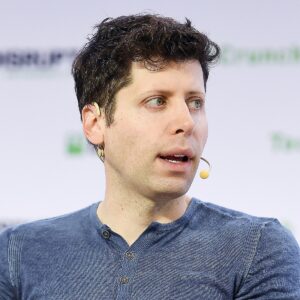Altman’s Worldcoin idea is out to reinvent the Aadhaar Wheel
Jaspreet Bindra

After creating a chatbot that has blurred the difference between a human and a machine, Sam Altman seems to want to create a new Turing Test to differentiate between the two. He calls it Worldcoin, a “new identity and financial network owned by everyone,” and he launched this on July 24. It consists of a digital identity called World ID and a digital cryptocurrency, WLD, and you can get this “simply for being human.” This new Turing Test, however, is not as simple as putting a machine in one room and a human in the other asking questions of the machine. ChatGPT and its ilk have made that test redundant – it is quite easy for a machine to convince you that it is human by giving very human sounding answers to your questions. This new test treads into biology: to certify that you are genuine legitimate human being, you need to go to an Orb, which is a biometric verification device and get your iris scanned. Currently Orbs in twenty-five cities across twenty countries are busy scanning human eyes and giving them around twenty-five world coins, worth approximately $2.18 for their trouble. Reportedly, more than two million authentic human beings are now the official citizens of World ID.
The purpose is noble, and ostensibly visionary. Altman has looked beyond the Silicon Valley bubble and seen a world which is overrun by human-like AI and robots, many of them doing most of the work that humans do today. The value produced by this work is then distributed amongst human beings (with biological retinas) as UBI or Universal Basic Income. To make that happen, we need to know who the real humans are, and for that we need an inviolable identity- that’s where World ID comes in. The UBI will presumably be distributed as Worldcoin. Not everyone thinks that this ‘decentralised, privacy-preserving solution’ to the world’s AI problem is a crazy idea. Andreessen Horowitz, Khosla Ventures, Reid Hoffman and others have pitched in $115mn at a $3bn valuation to make it happen. So has FTX’s Sam Bankman-Fried, but for some reason he is not mentioned front and centre in the press releases. Details of this project remain quite unclear, and crypto oriented investments are not a hot VC favourite right now, but Worldcoin seems to have bucked the trend. Admittedly, a large part of the excitement has to do with the inarguable genius and success of Altman himself. With distinctly Muskian overtones (though in a much humbler avatar), Altman is building and investing in companies that will reshape societies and the planet. The third leg of this effort is Oklo, a nuclear fission start-up which is chaired by Altman and is set to IPO at a $850mn valuation. In a recent interview with Financial Times, Altman was brimming with optimism: “These are independent parts of a specific vision of the future which I believe in. But they’re all doing their own things and they all work independently.”
At least two of his three initiatives put him on a collision course with governments worldwide. OpenAI’s GPT series, while drumming up great excitement, has also raised the hackles of regulators in many countries. Allegations of plagiarism, bias, and environmental degradation are being hurled at it, even while there is a looming fear of a looming superintelligence. Worldcoin has stumbled on its launch day itself, with the US clampdown on all things crypto preventing a US launch. “We didn’t think it would end up as ‘world minus the US coin’,” Altman confessed to the Financial Times recently. Altman, however, has a different take on this. He believes that governments have lost the ability to do big, life-changing projects. The governments of today cannot do another Manhattan Project or take the challenge of putting a man on other planets, or even build a new supersonic passenger plane again (to emphasise the point, he keeps a part of the Concorde in his office). “In a well functioning society, governments would be doing the AGI project and [nuclear] fusion and a whole bunch of things — and yet they’re not. “So we either sit around and watch the gradual decline of state capacity and say ‘that’s a bummer’ and we’re just not going to have any more technical progress… or you do the next best thing and just build great companies,” he told the FT recently (https://on.ft.com/3OmM0ie ).


